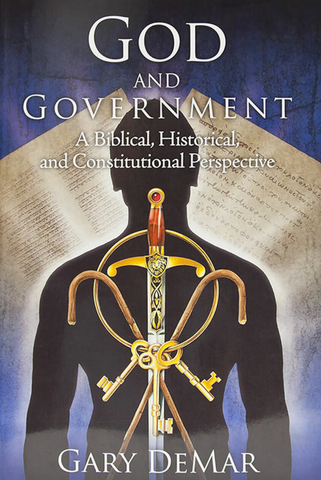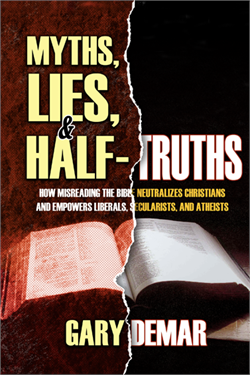The emphasis of the Moral Majority in 1980 was about politics even though Jerry Falwell and other Evangelicals disputed this charge. What Falwell and others meant was that the Bible has something to say about politics. Of course it does. Politics was a necessary initial emphasis when one considers the damage that has been inflicted on our nation by our national government, special interest groups, the courts, and misguided and misinformed voters (Christians included). It is even worse today. A spiritual and practical overhaul is needed by Christians and their pastors from the top-down and bottom-up. The impact on the political and social landscape by the Moral Majority is a distant memory and did little to change how to think about government, especially civil government.
Why? My guess is that most Americans believe the State should be our keeper, although in a more “moral” and “equitable” way. Only a small percentage of Americans (Christians included) would have voted for a 75 percent reduction in the operation of the national government, the privatization of Social Security, the abolition of the public (government) school system, and a full range of other government agencies and policies. For most Christians, politics is still the answer if they see it benefitting them. For example, “free public education!”
The people in Gideon’s day turned to a political solution to their problems when the real issue was personal responsibility (Judges 8:22-23). If they had a powerful king to rule over them, their problems would be solved by him and his agencies, so they thought. Abimelech wanted to turn the people back to the political faith (9:1-6). Jotham, the only surviving son of Gideon, warned the people of the inherent dangers in such a move (vv. 7-15). While there is the offer of shade (political salvation and security), it is an illusion that brings with it a choking tyranny (v. 15).
The choice of a political faith brought with it further oppression. Instead of crying out to God in repentance, the people abandoned personal holiness and opted for a new definition of what ought to be. The corrupted family (Judges 14-16) and priesthood (1 Sam. 2:12-17, 22-36) led the people to turn to the State for salvation (1 Sam. 8). In the process they rejected God from being king over them (v. 7). There is no neutrality. The Christian ought to call politics into question when it promises salvation, not because the civil realm is an illegitimate sphere of Christian activity. Politics was never meant to save; it cannot save. The same is true of what we call the “institutional Church.” While we are to redeem politics and the civil sphere of governments, we are never to view them as the solution to problems that are better managed under other spheres of influence. The purpose of involvement in politics is more than the replacement of non-Christians with Christians. A civil government based on a biblical view of the State would mean a drastic reduction in its size and power and a return of jurisdictional authority to individuals, private enterprise, families, churches, and local civil governments. There are similar dangers from within the church. It is sad and frightening to think that much of the church is not listening as the culture decays. There is historical precedent for this. Many Christians in Germany spoke out against the Nazi ideology and its threats to the nation, but not much interest was generated in the early days of the Third Reich. William Shirer makes this striking point:
I should have realized that a people who had so lightly given up their political, cultural and economic freedoms were not, except for a relatively few, going to die or even risk imprisonment to preserve freedom of worship. What really aroused the Germans in the 1930’s were the glittering successes of Hitler in providing jobs, creating prosperity, restoring Germany’s military might, and moving from one triumph to another in his foreign policy.[1]
The danger from within the church is as grievous as the danger from without. In many cases, the threat from within is more sinister because it bears the marks and authority of the church. There are two equal and opposite errors. (1) Telling Christians that involvement in politics is unbiblical, (2) politics can fix problems of the heart, and (3), civil government can fix inequities through legislation. Getting a Christian President will not do it. Stacking Congress and the Supreme Court will not do it. These are all good things, but they are not enough. Civilizations are built when all of life is influenced by the leavening effects of the gospel and the application of God’s law to every area of life. Too often we are quick to turn to politics because we as individuals, families, and churches have failed to be faithful in our areas of responsibility. Our efforts must be directed at the top and bottom. Individual lives, families, and churches must be reformed, and at the same time reforms must come from the centers of political influence. Pastors must teach about God and government from the pulpit moving into the broader culture and being “salt and light” (Matt. 5:13-16). Salt is a preservative, keeping the culture from experiencing social entropy, the inevitable decline of society as sin works out its rotting effects. The Christian also is light, pointing out the way to the spiritually blind.
Many Christians contend that if enough people are saved, the broader culture will change automatically. On the surface this might seem reasonable, but it misses a vital element. While the regenerate certainly have a new disposition to do right, they are often left without knowing what to do or how to do what is necessary. The specific ethic of God’s revealed laws has been reduced to the single ethic of an undefined “love.” Of course, the Bible does command us to love, but love without specific guidelines is nothing more than sentimentality often influenced by guilt manipulation.
The tactic of situation ethicists have used the love ethic. It’s unfortunate that conservative, Bible-believing Christians have fallen into the liberal’s trap.
Joseph Fletcher, the leading proponent of this school of thought, has little use for codes and rules. “Christian situation ethics,” he says, “reduces law from a statutory system of rules to the love canon alone.”… The Fundamental difficulty with the “situational” approach, of course is the absence of a definite criterion for what constitutes a “loving” course of action in any given situation. Harmon Smith asks, “How does a person know that he is doing (or has done) the loving thing in the situation?” The question is very much to the point. Apart from the abiding norms of divine revelation, the moral agent is left to the vagaries of personal preference, and the constantly changing “spirit of the age” to discern the “loving” thing.[2]
For example, we are not loving people by making them dependent on the State and its social programs designed to promise to make life better for all Americans that only increase the power and authority of the bureaucratic State. Christians should never see their entry into politics to manage the beast of government.
The biblical social order is utterly hostile to the pyramid society. The biblical social order is characterized by the following features. First, it is made up of multiple institutional arrangements, each with its own legitimate, limited, and derivative sovereignty under God’s universal law. Second, each institution possesses a hierarchical chain of command, but these chains of command are essentially appeals courts—“bottom-up” institutions—with the primary duty of responsible action placed on people occupying the lower rungs of authority. Third, no single institution has absolute and final authority in any instance; appeal can be made to other sovereign agents of godly judgment. Since no society can attain perfection, there will be instances of injustice, but the social goal is harmony under biblical law, in terms of an orthodox creed. God will judge all men perfectly. The State need not seek perfect justice, nor should citizens be taxed at the astronomical rates necessary to sustain the quest for perfect justice.[3]
You and I are responsible to learn how to accomplish this goal. It includes study, practice, and implementation in the spheres of influence over which we have control. Joseph Kickasola gave us the GPS directions more than three decades ago: “We do not believe in revolution or in massive and rapid social change…. What is important is bottom-up-ism, grassroots-transforming, moral and spiritual change. This will require the salvation of souls and world mission, as well as legislative reform, for we cannot allow our social base and religious liberty to deteriorate in the meantime.”[4]

God and Government
American Vision has thoroughly renovated, revised, and updated Gary DeMar’s monumental work into this beautiful one-volume hardback. With a fresh new look, more images, an extensive subject and scripture index, and an updated bibliography, God and Government is ready to prepare a whole new generation to take on the political and religious battles confronting Christians today. May it be used in a new awakening of Christians in America—not just to inform minds, but to stimulate action and secure a better tomorrow for our posterity.

Moses and Pharaoh
The conflict between Moses and Pharaoh was a conflict between the religion of the Bible and its rival, the religion of humanism. It is not common for scholars to identify Egypt’s polytheism with modern humanism, but the two theologies share their most fundamental doctrines: the irrelevance of the God of the Bible for the affairs of men; the evolution of man into God; the impossibility of an infallible word of God; the nonexistence of permanent laws of God; the impossibility of temporal judgment by God; and a belief in the power of man.

Myths, Lies, and Half-Truths
Myths, Lies, and Half-Truths takes a closer look at God’s Word and applies it to erroneous misinterpretations of the Bible that have resulted in a virtual shut-down of the church’s full-orbed mission in the world (Acts 20:27). Due to these mistaken interpretations and applications of popular Bible texts to contemporary issues, the Christian faith is being thrown out and trampled under foot by men (Matt. 5:13).
[1] William L. Shirer, The Nightmare Years: 1930-1940 (Boston, MA: Little, Brown and Company, 1984), 156.
[2] John Jefferson Davis, Evangelical Ethics: Issues Facing the Church Today (Phillipsburg, NJ: Presbyterian and Reformed, 1985), 12-13.
[3] Gary North, Moses and Pharaoh: Dominion Religion Versus Power Religion (Tyler, TX: Institute for Christian Economics, 1985), 211-212.
[4] Quoted by Rodney Clapp, “Democracy as Heresy,” Christianity Today (February 20, 1987), 20. Gary North wrote that Clapp’s quotation of Kickasola was one of the things he got correct in his critique of Christian Reconstruction. Gary North, Westminster’s Confession (Tyler, TX: Institute for Christian Economics, 1991), 330.
















